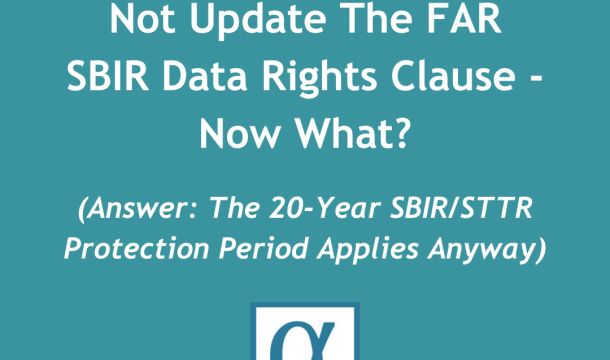The GovCon Bulletin™
15
Jun, 2016
OFCCP Publishes Final Rule Prohibiting Sex Discrimination By Contractors
June 15, 2016
Join Complimentary Webinar on June 17 Discussing the Federal SBIR & STTR Programs!
On June 17, 2016, I will be providing an overview of the federal government's SBIR & STTR programs, as part of a webinar series hosted by my good friend and law firm colleague, Jennifer Schaus, Founder & Principal of Jennifer Schaus & Associates.
To register go here. In this edition of The GovCon Bulletin, we review the final rule, published by the OFCCP this morning, that revises its Guidelines for complying with prohibitions against discrimination on the basis of sex.
Mark Amadeo
Today, the U.S. Department of Labor’s Office of Federal Contract Compliance Programs published a final rule, which can be found here and is effective August 15, 2016, that substantially revises its Sex Discrimination Guidelines (the “Guidelines”). The Guidelines, at 41 CFR part 60-20, set forth obligations of contractors and subcontractors that arise under Executive Order 11246 ("E.O. 11246"). E.O. 11246 prohibits employment discrimination by contractors on the basis of race, color, religion, sex, sexual orientation, gender identity, or national origin, and requires them to take affirmative action to ensure that applicants and employees are treated without regard to these protected bases. The Guidelines, as amended, focus on requirements that contractors and subcontractors and federally assisted construction contractors and subcontractors must meet to ensure nondiscrimination in employment on the basis of sex and to take affirmative action to ensure that applicants and employees are treated without regard to their sex.
The Guidelines had not been updated since 1970. Consequently, the final rule – which, as summarized below, is organized into eight sections and an Appendix – removes outdated provisions and adds, restates, reorganizes and clarifies other provisions to incorporate legal developments and to address contemporary problems in implementation.
The first section, at § 60-20.1, describes the rule's purpose. The section also adds a new sentence stating: “For instance, under no circumstances will a contractor's good faith efforts to comply with the affirmative action requirements of part 60-2 of this chapter be considered a violation of this part.” This is intended to address concerns that the prohibitions of sex discrimination could be read to conflict with contractors' obligations to undertake good faith efforts to expand employment opportunities for women.
The second section, at § 60-20.2, sets forth the general prohibition against sex discrimination, including discrimination on the bases of pregnancy, childbirth, related medical conditions, gender identity, transgender status, and sex stereotypes. It also describes employment practices that may unlawfully treat men and women disparately. Lastly, the second section describes employment practices that are unlawful if they have a disparate impact on the basis of sex and are not job-related and consistent with business necessity.
The third section, at § 60-20.3, describes circumstances in which disparate treatment on the basis of sex may be lawful— namely, when being a particular sex is a bona fide occupational qualification reasonably necessary to the normal operation of the contractor's business.
The fourth section, at § 60-20.4, covers sex-based discrimination in compensation and provides examples of unlawful conduct. For example, contractors violate the regulation any time they pay wages, benefits, or other compensation that results in whole or in part from the application of any discriminatory compensation decision or other practice.
The fifth section, at § 60-20.5, prohibits discrimination on the basis of pregnancy, childbirth, and related medical conditions. The section also lists examples of “related medical conditions” and provides four examples of discriminatory practices. It also discusses application of these principles to the provision of workplace accommodations and leave.
The sixth section, at § 60-20.6, states that sex discrimination in the provision of fringe benefits is unlawful. The section explains that fringe benefits includes medical, hospital, accident, life insurance, retirement benefits, profit-sharing and bonus plans, leave, and other terms, conditions, and privileges of employment. Lastly, the section clarifies that the increased cost of providing a fringe benefit to members of one sex is not a defense to a contractor's failure to provide benefits equally to members of both sexes.
The seventh section, at § 60-20.7, prohibits employment decisions on the basis of sex-based stereotypes and describes four categories of discrimination: sex-based stereotypes based on dress, appearance, and/or behavior; adverse treatment based on gender identity or transgender status; adverse treatment based on sex stereotype about women working in a particular job, sector, or industry; and adverse treatment based on sex-based stereotypes about caregiving roles.
The eighth section, at § 60-20.8, prohibits sexual harassment. The section explains that unwelcome sexual advances, requests for sexual favors, offensive remarks about a person's sex, and other verbal or physical conduct of a sexual nature constitute sexual harassment when: (1) submission to the conduct is made either explicitly or implicitly a term or condition of an individual's employment; (2) submission to or rejection of such the conduct by an individual is used as the basis for employment decisions affecting such individual; or (3) the conduct has the purpose or effect of unreasonably interfering with an individual's work performance or creating an intimidating, hostile, or offensive working environment. The section also explains that sexual harassment includes harassment based on gender identity; harassment based on pregnancy, childbirth, or related medical conditions; and harassment that is not sexual in nature but that is because of sex or sex-based stereotypes.
Finally, the final rule contains an Appendix that sets forth, for contractors' consideration, a number of practices that contribute to the establishment and maintenance of workplaces that are free of unlawful sex discrimination. These practices, summarized below, are not required:
- Avoiding gender-specific job titles like “foreman” or “lineman” if alternatives are available
- Designating single-user restrooms, changing rooms, showers, or similar single-user facilities as sex-neutral
- Providing light duty, modified job duties or assignments, or other reasonable accommodations to employees unable to perform job duties because of pregnancy, childbirth, or related medical conditions
- Providing appropriate time off and flexible workplace policies for men and women
- Encouraging men and women equally to engage in caregiving-related activities
- Fostering a climate in which women are not assumed to be more likely to provide family care than men
- Fostering an environment in which all employees feel safe, welcome, and treated fairly, by developing and implementing procedures to ensure that employees are not harassed because of sex, such as: communicating to all personnel that harassing conduct will not be tolerated; providing anti-harassment training to all personnel; and establishing and implementing procedures for handling and resolving complaints about harassment and intimidation based on sex.

Mark A. Amadeo
Principal


